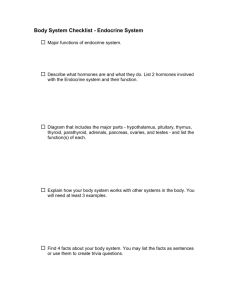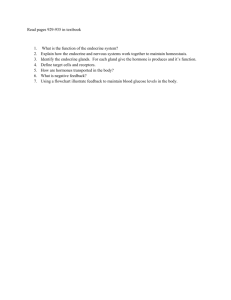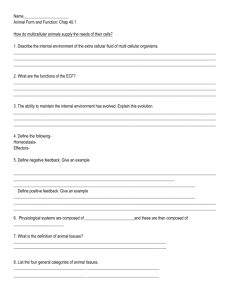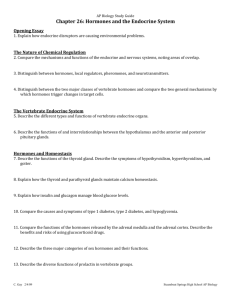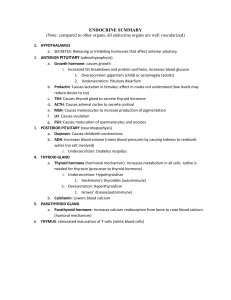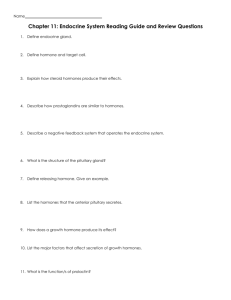Chap 48 NCLEX
advertisement
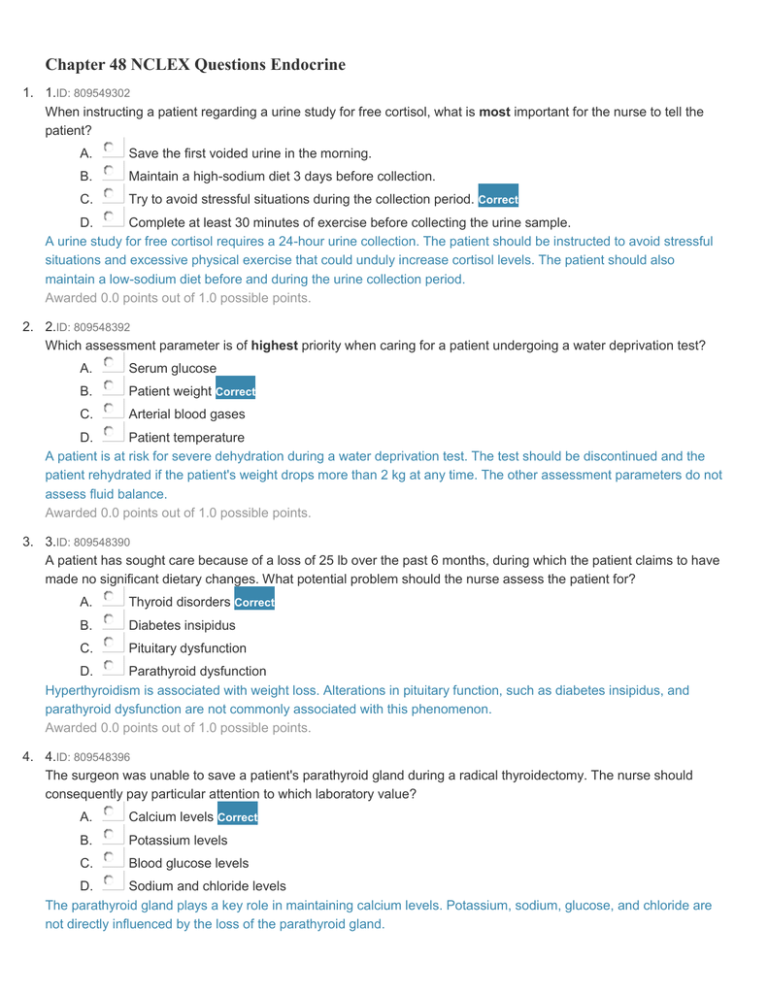
Chapter 48 NCLEX Questions Endocrine 1. 1.ID: 809549302 When instructing a patient regarding a urine study for free cortisol, what is most important for the nurse to tell the patient? A. Save the first voided urine in the morning. B. Maintain a high-sodium diet 3 days before collection. C. Try to avoid stressful situations during the collection period. Correct D. Complete at least 30 minutes of exercise before collecting the urine sample. A urine study for free cortisol requires a 24-hour urine collection. The patient should be instructed to avoid stressful situations and excessive physical exercise that could unduly increase cortisol levels. The patient should also maintain a low-sodium diet before and during the urine collection period. Awarded 0.0 points out of 1.0 possible points. 2. 2.ID: 809548392 Which assessment parameter is of highest priority when caring for a patient undergoing a water deprivation test? A. Serum glucose B. Patient weight Correct C. Arterial blood gases D. Patient temperature A patient is at risk for severe dehydration during a water deprivation test. The test should be discontinued and the patient rehydrated if the patient's weight drops more than 2 kg at any time. The other assessment parameters do not assess fluid balance. Awarded 0.0 points out of 1.0 possible points. 3. 3.ID: 809548390 A patient has sought care because of a loss of 25 lb over the past 6 months, during which the patient claims to have made no significant dietary changes. What potential problem should the nurse assess the patient for? A. Thyroid disorders Correct B. Diabetes insipidus C. Pituitary dysfunction D. Parathyroid dysfunction Hyperthyroidism is associated with weight loss. Alterations in pituitary function, such as diabetes insipidus, and parathyroid dysfunction are not commonly associated with this phenomenon. Awarded 0.0 points out of 1.0 possible points. 4. 4.ID: 809548396 The surgeon was unable to save a patient's parathyroid gland during a radical thyroidectomy. The nurse should consequently pay particular attention to which laboratory value? A. Calcium levels Correct B. Potassium levels C. Blood glucose levels D. Sodium and chloride levels The parathyroid gland plays a key role in maintaining calcium levels. Potassium, sodium, glucose, and chloride are not directly influenced by the loss of the parathyroid gland. 5. 5.ID: 809549306 A patient's recent medical history is indicative of diabetes insipidus. The nurse would perform patient teaching related to which diagnostic test? A. Thyroid scan B. Fasting glucose test C. Oral glucose tolerance D. Water deprivation test Correct A water deprivation test is used to diagnose the polyuria that accompanies diabetes insipidus. Glucose tests and thyroid tests are not directly related to the diagnosis of diabetes insipidus. Awarded 0.0 points out of 1.0 possible points. 6. 6.ID: 809548398 When caring for the patient with a traumatic brain injury (TBI), the nurse knows that damage to which endocrine gland can affect the hormone secretion from some of the other endocrine glands? A. 1 B. 2 C. 3 Correct D. 4 With a TBI, the anterior pituitary is likely to be damaged. The anterior pituitary gland secrets tropic hormones that control the secretion of hormones by other endocrine glands (the thyroid, adrenal cortex, and reproductive organs). The parathyroids secrete parathyroid hormone that regulates serum calcium level by acting on bone, the kidneys, and indirectly the gastrointestinal tract. The pineal gland secretes melatonin that helps regulate circadian rhythm and reproduction. The thyroid glands secrete thyroxine (T4), triiodothyronine (T3) that regulates the cell processes of cell growth and tissue differentiation, and calcitonin that affects bone tissue to regulate serum calcium and phosphorus levels. Awarded 0.0 points out of 1.0 possible points. 7. 7.ID: 809549300 When the nurse assesses the patient that has pancreatitis, what function may be altered related to the endocrine function of the pancreas? A. Blood glucose regulation Correct B. Increased response to stress C. Fluid and electrolyte regulation D. Regulates metabolic rate of cells The endocrine functions of the pancreas are regulated by α cells that produce and secrete glucagon, β cells that produce and secrete insulin and amylin, delta cells that produce and secrete somatostatin, and F cells that secrete pancreatic polypeptide. Glucagon, insulin, and amylin, and somatostatin all affect blood glucose. Pancreatic polypeptide regulates appetite. Increased response to stress occurs from epinephrine secreted by the adrenal medulla. Fluid and electrolyte regulation occurs in response to several hormones (mineralocorticoids, antidiuretic hormone, parathyroid hormone, calcitonin) from several organs (adrenal cortex, posterior pituitary, parathyroid, thyroid). The metabolic rate of cells is regulated by triiodothyronine (T3) from the thyroid. Awarded 0.0 points out of 1.0 possible points. 8. 8.ID: 809549304 The hypothalamus secretes releasing hormones and inhibiting hormones. What is the target tissue of these releasing hormones and inhibiting hormones? A. Pineal B. Adrenal cortex C. Posterior pituitary D. Anterior pituitary Correct The anterior pituitary is the target tissue of the releasing hormones (corticotropin releasing hormone, thyrotropin releasing hormone, growth hormone releasing factor, gonadotropin releasing hormone, prolactin releasing factor) and the inhibiting hormones (somatostatin, prolactin inhibiting factor). These hormones release or inhibit other hormones that affect the thyroid, adrenal cortex, pancreas, reproductive organs, and all body cells. The pineal gland is not directly affected by the releasing and inhibiting hormones from the hypothalamus. The posterior pituitary releases antidiuretic hormone (ADH) in response to plasma osmolality changes that is not directly affected by the hypothalamus hormones. Awarded 0.0 points out of 1.0 possible points. 9. 9.ID: 809548394 The patient has been feeling tired lately and has gained weight; reports thickened, dry skin and increased cold sensitivity even though it is now summer. Which endocrine diagnostic test should be done first? A. Free thyroxine (FT4) Correct B. Serum growth hormone (GH) C. Follicle stimulating hormone (FSH) D. Magnetic resonance imaging (MRI) of the head The manifestations the patient is experiencing could be related to hypothyroidism. Free thyroxine (FT4) is considered a better indicator of thyroid function than total T4 and could be done to evaluate the patient for hypothyroidism. Growth hormone excess could cause thick, leathery, oily skin but does not demonstrate the other manifestations. FSH is manifest with menstrual irregularity and would be useful in distinguishing primary gonadal problems from pituitary insufficiency. MRI is the examination of choice for radiologic evaluation of the pituitary gland and the hypothalamus but would not be the first diagnostic study to further explore the basis of these manifestations. Awarded 0.0 points out of 1.0 possible points.


